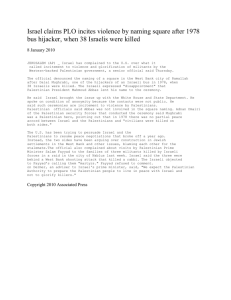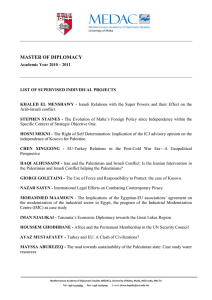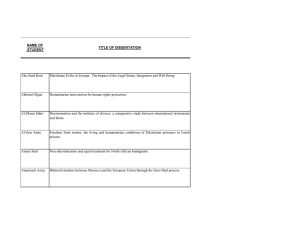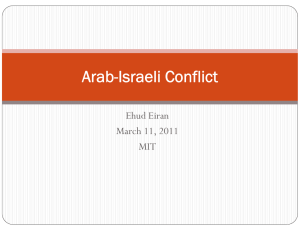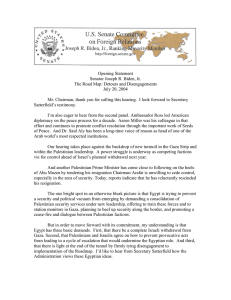UNIVERSAL PERIODIC REVIEW OF ISRAEL
advertisement
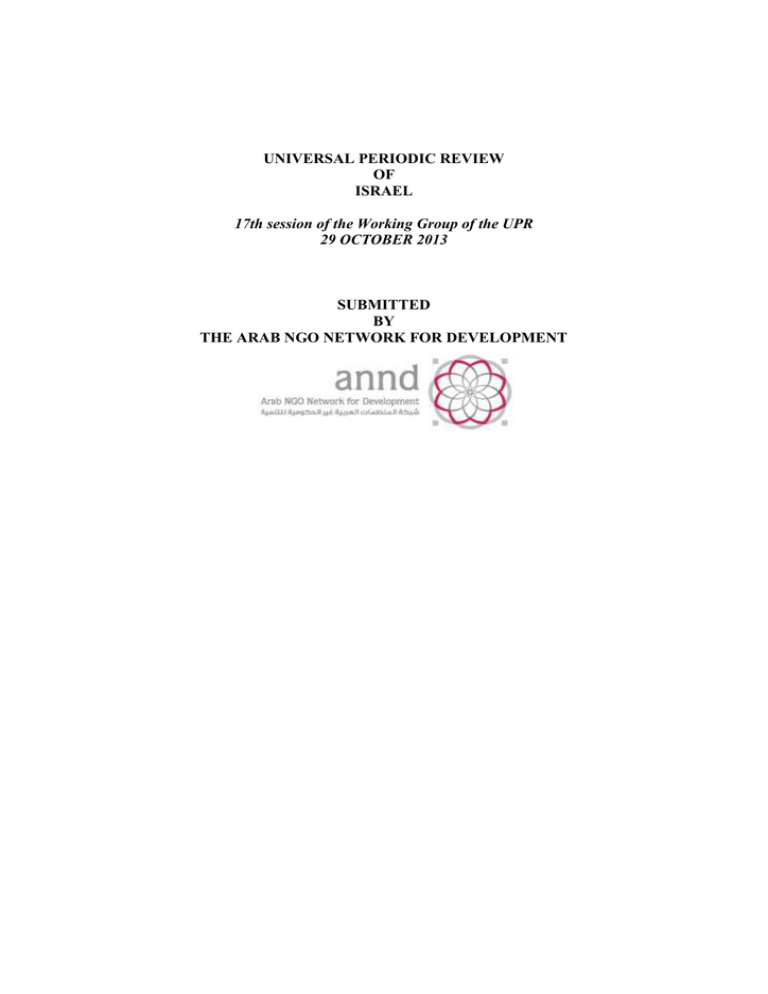
UNIVERSAL PERIODIC REVIEW OF ISRAEL 17th session of the Working Group of the UPR 29 OCTOBER 2013 SUBMITTED BY THE ARAB NGO NETWORK FOR DEVELOPMENT This brief document is submitted with regard to Universal Periodic Review of Israel, which is scheduled to take place on October 29th 2013, after a postponement from the original date in January 2013 due to Israel’s non-cooperation with the Human Rights Council. The Arab NGO Network for Development together with Mossawa Center presented a joint submission by the given deadline July 16th, 2012 for the second cycle revision of Israel. This submission was extensively referred in the OHCHR summary of stakeholders’ submission, quoted as Joint Submission 4. With the submission of this additional information, we would to like to raise and bring into attention of Human Rights council Working Group members complementary information covering the period from earlier deadline (July 2012) to September 30th, 2013. In this regard, the most significant development since July 2012 is the General Assembly voting on 29 November 2012, which recognized Palestine as a nonmember observer state. This status is a crucial step on the path to the realization of right of self-determination that belongs to the Palestinian people as a whole. 1. The Israeli occupation is the major challenge and obstacle that the Palestinian society has and that obstructs its development. The basic right of security, peaceful existence and self-determination for the Palestinian people, as well as its right to exist in an independent Palestinian State continues to be violated, resulting in deteriorating human rights conditions in the country, including poverty, unemployment, health care and education. The international community evidently recognize the violations that Israel is committing and continues to call Israel to respect all United Nations resolutions and its obligations under international human rights law and international humanitarian law, with a view to guaranteeing fundamental rights and freedoms to all Palestinians in the Occupied Palestinian Territories. 2. The latest report by the United Nations Special Rapporteur on the situation of human rights in the occupied Palestinian territories, dated 3 June 2013, indeed revealed systematic violations that Israel continues to commit including annexing Palestinian territory. Among others the report revealed that: “The fishing industry has been hard hit by Israeli restrictions and interference with fishing operations. Fishing had been restricted to three nautical miles, which limits productive activity severely, as most edible fish are mostly found between 12 and 20 nautical miles from shore. It is difficult for most Gazan fishermen to earn enough to sustain a minimum standard of living for his family. The Israeli blockade is responsible for this crisis of dependency [on aid], with an astounding 70 per cent Gazans being aid dependent today compare with only 10 per cent prior to the blockade in 2007. The water situation is desperate, with 90 per cent of Gaza's aquifer “unfit for human consumption," and Israel diverting a disproportionate share of the coastal aquifer. Israel currently diverts 92 per cent of aquifers for its own use, and this deprives Gaza of the most efficient way to satisfy its water needs. The Israel's maintenance of a security buffer zone on the Gaza side of the border that deprives Palestinian farmers of 34 per cent of available agricultural land”1. 3. Although the illegal settlements’ impacts on the life Palestinians was made 1 http://unispal.un.org/UNISPAL.NSF/0/E4965C3A265268F885257B800065DD5 5 clear with the latest report of the fact-finding mission2, by the end of 2012 around 650,000 Israelis had settled in the occupied Palestinian territory. Moreover, as noted by Special Rapporteur, in the first quarter of 2013, Israel demolished 204 Palestinian homes and structures, displacing 379 Palestinians. Moreover, settler violence continues, 146 cases of settler-related violence resulting in Palestinian casualties or property damage have been reported by June 2013. 4. By the end of May Israel had 4,979 Palestinians, including 236 children, in its prisons and around 200 Palestinians constantly remain in administrative detention despite several cases on reliance on solitary confinement, denial of family visits, punishment of hunger striking prisoners, punishment for purely political activity, inadequate medical facilities. 5. There is serious work undertaken by civil society organizations and movements (i.e. Boycotts, Divestments and Sanctions www.bdsmovement.net) shedding light on violations deriving from the businesses gaining profits in occupied Palestine and international trading of companies with these Israeli companies. Indeed, several companies, academics, civil society activists, human rights defenders and civilians in international community support this initiative. A recent and clear step taken in this regard came as well by the European Union through the adoption of guidelines with compliance with their legal obligation not to recognize Israeli sovereignty over the occupied territory and to ensure respect for the Geneva Conventions. The guidelines, once implemented, will provide effective means for implementing the 10 December 2012 position agreed upon by all Foreign Ministers of the EU that says: “all agreements between the State of Israel and the EU must unequivocally and explicitly indicate their inapplicability to the territories occupied by Israel in 1967.” Accordingly, any Israeli entity with activity in the Occupied Palestinian Territory will be excluded from receiving any EU loans and similar financial services. 6. Israeli policy towards adoption of drastic aggressive measures to stop any attempt towards the quest of freedom by Palestinian people persists. The raid by Israeli occupation army to Palestinian civil society continues. For instance, on December 11th 2012, the offices of three civil society organizations based in Ramallah, namely the Palestinian NGO Network (PNGO), Women’s Union and Addameer; an advocate for Palestinians in Israeli jails, were attached, resulting in confiscating five computers from the latter group. The incident adds to Israeli record of continuous violation of international humanitarian and human rights law and the continuous challenge Palestinian people are facing for the enjoyment of freedom of association and freedom of opinion and of expression under Israeli occupation. 7. We recall the recommendations included in our submission to the attention of Human Rights Council Working Group members: Respect all United Nations resolutions and its obligations under international human rights law and international humanitarian law, with a view to guaranteeing fundamental rights and freedoms to all Palestinians in the Occupied Palestinian Territories Give an immediate end to occupation and illegal settlements that stand as the root cause and obstacle for the self-development of Palestinian society and give an immediate end to the discriminatory “Israeli planning, development and land system which violates the right to adequate housing not only of Palestinians 2http://www.ohchr.org/Documents/HRBodies/HRCouncil/RegularSession/Sess ion19/FFM/FFMSettlements.pdf under Israeli control, but also of low income persons of all identities”. Fully respect the rights and dignity of the Palestinian people, including their rights to life, to live in dignity, adequate food and housing, together with their freedom of movement. Fully comply with its obligations to ensure the availability of sufficient and safe drinking water and adequate sanitation for Palestinians living in the OPT, initially starting with giving an immediate end to discriminative policies that limit the accessibility of these rights. Given the importance of agriculture for Palestinian economy, give an immediate end to Israeli policies that hinders Palestinians‟ access to their agricultural lands in all their territories. Put an immediate end to all kinds of obstacles such as restrictions on movement, work permits and unequal and discriminative policies undertaken by the occupying forces in the OPT, which hinder the right to work of the Palestinians

